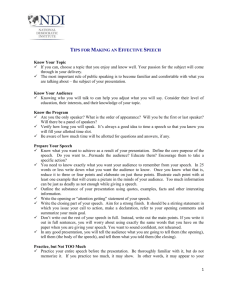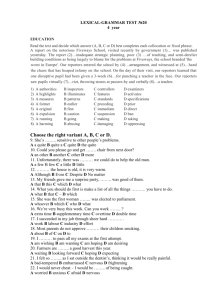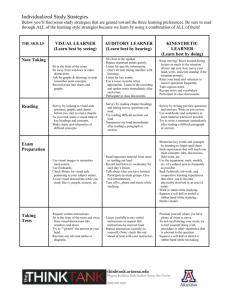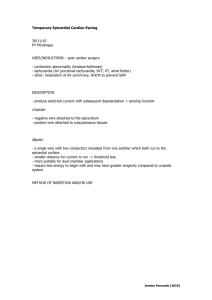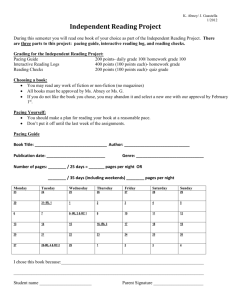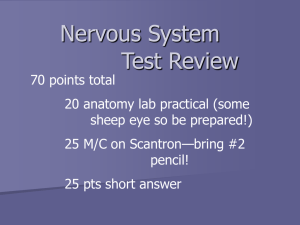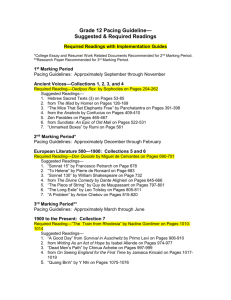Public Speaking Tips
advertisement
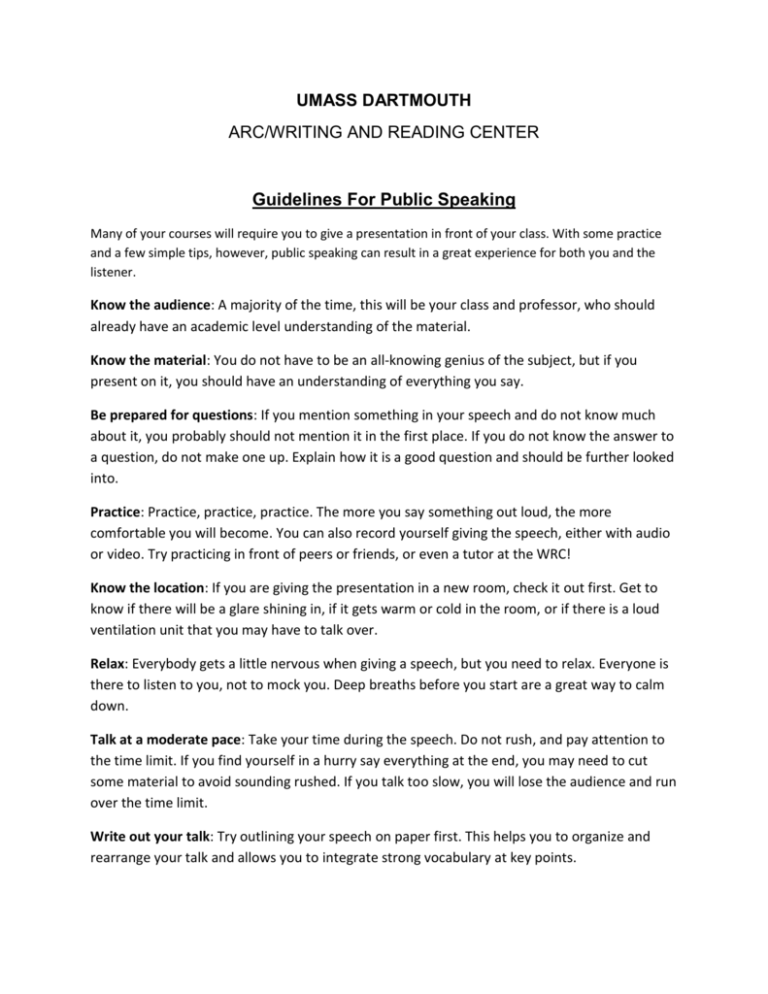
UMASS DARTMOUTH ARC/WRITING AND READING CENTER Guidelines For Public Speaking Many of your courses will require you to give a presentation in front of your class. With some practice and a few simple tips, however, public speaking can result in a great experience for both you and the listener. Know the audience: A majority of the time, this will be your class and professor, who should already have an academic level understanding of the material. Know the material: You do not have to be an all-knowing genius of the subject, but if you present on it, you should have an understanding of everything you say. Be prepared for questions: If you mention something in your speech and do not know much about it, you probably should not mention it in the first place. If you do not know the answer to a question, do not make one up. Explain how it is a good question and should be further looked into. Practice: Practice, practice, practice. The more you say something out loud, the more comfortable you will become. You can also record yourself giving the speech, either with audio or video. Try practicing in front of peers or friends, or even a tutor at the WRC! Know the location: If you are giving the presentation in a new room, check it out first. Get to know if there will be a glare shining in, if it gets warm or cold in the room, or if there is a loud ventilation unit that you may have to talk over. Relax: Everybody gets a little nervous when giving a speech, but you need to relax. Everyone is there to listen to you, not to mock you. Deep breaths before you start are a great way to calm down. Talk at a moderate pace: Take your time during the speech. Do not rush, and pay attention to the time limit. If you find yourself in a hurry say everything at the end, you may need to cut some material to avoid sounding rushed. If you talk too slow, you will lose the audience and run over the time limit. Write out your talk: Try outlining your speech on paper first. This helps you to organize and rearrange your talk and allows you to integrate strong vocabulary at key points. Public Speaking Workshop (WRC) Bring the outline with you: There is no shame in having your speech/slides in front of you on a print out. This will help jog your memory for points you wish to make and may help with pacing. Get to know the computer: If you are using PowerPoint, use the presenter’s view. This allows you to access onscreen notes, use the mouse as a pointer and take advantage of the timer options for pacing. Do not read your talk word for word: Reading your talk word for word, or straight off a slide, is an easy way to lose audience interest. More often than not you may get nervous trying to read everything and you will get lost, which makes you appear unprepared. Eye contact: Be sure to face the audience during your speech. If explaining slides, do not talk while you are facing the slides because no one will hear you. Look up and out towards the audience to see if you are holding their attention. If direct eye contact makes you nervous, try looking toward the back of the room just above the audience. Do not apologize: If you skip a point, do not fret or apologize for it. Instead, work it in later on in your speech. If you lose your place, just slow down and grab a drink of water. People are less likely to notice anything went wrong unless you start apologizing. Body Language: How you present is a personal matter and no one should take away your style. However, constant pacing around the room can become distracting to the audience. Moving your hands a great deal or jingling your keys can also become distracting. Try holding a paperclip in your pocket if you move your arms too much, or if there is a podium you can place your arms on the top of it. Locate yourself to one side or the other of the projected slides. Distractions: It is unavoidable; some people will stop paying attention and you will notice them on their phones or drifting off. Do not let these distractions bother you. Accept them, and move on. Voice: Speak clearly, loudly, and emphatically. Using a monotone voice or speaking softly will lose your audience. By pausing at certain points, repeating key words or phrases, stressing your voice, and speaking with command rather than question, you will appear more professional and more confident. Mike Savaria (2014)
